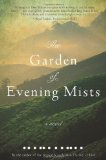Summary | Excerpt | Reviews | Beyond the Book | Readalikes | Genres & Themes | Author Bio

A section of Majuba Tea Estate is visible to the east over the
fence. The hollow of the valley reminds me of the open palms of a
monk, cupped to receive the day's blessing. It is Saturday, but the
tea pickers are working their way up the slopes. There has been a
storm in the night, and clouds are still marooned on the peaks. I step
down the verandah onto a narrow strip of ceramic tiles, cold and
wet beneath my bare soles. Aritomo obtained them from a ruined
palace in Ayutthaya, where they had once paved the courtyard of
an ancient and nameless king. The tiles are the last remnants of a
forgotten kingdom, its histories consigned to oblivion.
I fill my lungs to the brim and exhale. Seeing my own breath take
shape, this cobweb of air that only a second ago had been inside me,
I remember the sense of wonder it used to bring. The fatigue of the
past months drains from my body, only to flood back into me a
moment later. It feels strange that I no longer have to spend my
weekends reading piles of appeal documents or catching up with the
week's paperwork.
I breathe out through my mouth a few more times, watching my
breaths fade away into the garden.
My secretary, Azizah, brought me the envelope shortly before we
left my chambers to go into the courtroom. "This came for you just
now, Puan," she said.
Inside was a note from Professor Yoshikawa Tatsuji, confirming
the date and time of our meeting in Yugiri. It had been sent a week
before. Looking at his neat handwriting, I wondered if it had been
a mistake to have agreed to see him. I was about to telephone him
in Tokyo to cancel the appointment when I realized he would
already be on his way to Malaysia. And there was something else
inside the envelope. Turning it over, a thin wooden stick, about five
inches long, fell out onto my desk. I picked it up and dipped it into
the light of my desk lamp. The wood was dark and smooth, its tip
ringed with fine, overlapping grooves.
"So short-lah, the chopstick. For children is it?" Azizah said,
coming into the room with a stack of documents for me to sign.
"Where's the other one?"
"It's not a chopstick."
I sat there, looking at the stick on the table until Azizah reminded
me that my retirement ceremony was about to begin. She helped me
into my robe and together we went out to the corridor. She walked
ahead of me as usual to give the advocates warning that Puan
Hakim was on her way—they always used to watch her face to
gauge my mood. Following behind her, I realized that this would
be the last time I would make this walk from my chambers to my
courtroom.
Built nearly a century ago, the Supreme Court building in Kuala
Lumpur had the solidity of a colonial structure, erected to outlast
empires. The high ceilings and the thick walls kept the air cool even
on the hottest of days. My courtroom was large enough to seat
forty, perhaps even fifty people, but on this Tuesday afternoon the
advocates who had not arrived early had to huddle by the doors at
the back. Azizah had informed me about the numbers attending the
ceremony but I was still taken aback when I took my place on the
bench beneath the portraits of the agong and his queen. Silence
spread across the courtroom when Abdullah Mansor, the chief justice,
entered and sat down next to me. He leaned over and spoke
into my ear. "It's not too late to reconsider."
"You never give up, do you?" I said, giving him a brief smile.
"And you never change your mind." He sighed. "I know. But
can't you stay on? You only have two more years to go."
Looking at him, I recalled the afternoon in his chambers when I
told him of my decision to take early retirement. We had fought
about many things over the years—points of law or the way he
administered the courts—but I had always respected his intellect,
his sense of fairness and his loyalty to us judges. That afternoon was
the only time he had ever lost his composure with me. Now there
was only sadness in his face. I would miss him.
Excerpted from The Garden of Evening Mists by Tan Twan Eng. Copyright © 2012 by Tan Twan Eng. Excerpted by permission of Weinstein Books. All rights reserved. No part of this excerpt may be reproduced or reprinted without permission in writing from the publisher.




Information is the currency of democracy
Click Here to find out who said this, as well as discovering other famous literary quotes!
Your guide toexceptional books
BookBrowse seeks out and recommends the best in contemporary fiction and nonfiction—books that not only engage and entertain but also deepen our understanding of ourselves and the world around us.